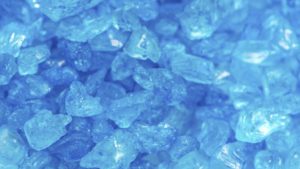13 August 2016 – Authors: Lea Emery and Jessica Elder – Source: Gold Coast Bulletin
 Arrests soar by 250 per cent in less than a decade
Arrests soar by 250 per cent in less than a decade
ARRESTS for possessing the horror drug ice have soared by 250 per cent on the Gold Coast in less than a decade.
Police statistics show the shocking rise in use of the party drug which has been linked to violent attacks, psychosis, mental illness and dozens of thefts.
In the 2008-09 financial year just 372 people were caught with the drug but by the 2015-16 financial year that had risen to a staggering 1330.
The figures also show the number of people pushing the drug increased sevenfold, with just three charged with trafficking methyl amphetamine in 2008-09 compared to 21 in the past financial year.
Supply of the drug increased by 120 per cent between 2008-09 and last financial year.
In 2008-09 just eight people were charged with producing ice but that had risen to 22 by the 2015-16 financial year.
Police claim the surge is due to about 100 more officers on the ground and a move to rapid action policing.
“Drugs are not necessarily a reported crime,” said Gold Coast Police Chief Superintendent Terry Borland.
“It is often a result of a person being in contact with the police.”
But he admitted there was no easy answer.
“There is no quick fix on this. If there was, it would have been solved long ago.”
However, a senior police officer said ice was the epidemic no one wanted to talk about.
“But it’s there. It’s really an epidemic, like I have never seen,” the officer said.
“I was around in the heroin era and I have never seen anything this bad. It is a drug people are getting into at a really young age.”
Lives Lived Well manager Suzi Morris said the age of addicts was becoming younger.
“We are seeing 15, 16 and 17 year olds who need help with addiction,” she said.
Ms Morris said many teenagers fell into drugs because they were disengaged or had been excluded from school.
Hader Clinic Queensland director Melinda Symon said coping with an addict was about tough love.
“The way I see it, they have three options and they are going to jail, going to rehabilitation and the other option is they will end up dead,” she said.
Ms Symon said parents and family members of addicts should not enable their habit by refusing to provide cash.
In July, the Federal Government pledged more than $3 million to the Gold Coast area to tackle ice.
The Gold Coast Primary Health Network CEO Matt Cordus said the network would spend six months determining the best way to spend the money most effectively.
He said the next step would be a public meeting at the end of the month to discuss needs and possible solutions.
“Preliminary feedback, which impacts on the broader sector not just health, has identified early intervention, education and access to appropriate services,” Mr Cordus said.
The assessment is expected to be finalised in the next couple of months and implementation started from January 1.


